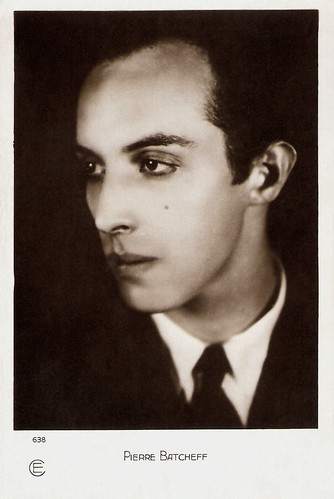
French postcard by Cinémagazine-Edition, no. 638.
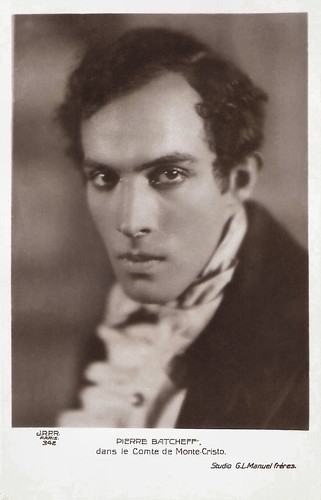
French postcard by J.R.P.R., Paris, no. 348. Photo: Studio G.L. Manuel Frères. Publicity still for Le Comte de Monte-Christo/Monte Cristo (Henri Fescourt, 1929).
Elegant posture
Pierre Batcheff, originally Benjamin Batcheff (according to some sources Piotr Bacev), was of Russian descent. He was born in 1901 (according to some sources 1907) in Harbin, Russian Empire (now Pin-Kiang, Northeast China).
He debuted on stage in Geneva with Ludmilla and Georges Pitoëff.
In 1924 he started his cinema career in films like the comedy Claudine et le poussin/Claudine and the Chick (Marcel Manchez, 1924), in which he had the male lead opposite Dolly Davis. His good-looking appearance and his elegant posture made him a beloved jeune premier in the French cinema of the 1920s.
Before playing the memorable part of general Hoche in Abel Gance’s epic film Napoléon (1927), he played in films as Le double amour/Double Love (Jean Epstein, 1925) with Jean Angelo, Feu Mattia Pascal/The Late Mathias Pascal (Marcel L'Herbier, 1926) starring Ivan Mozzhukhin, and Le joueur d’échecs/The Chess Player (Raymond Bernard, 1927) featuring Pierre Blanchar.
The gifted Pitoëff pupil struck because of his professional attitude. It made Pierre Batcheff one of the stars of French silent cinema.
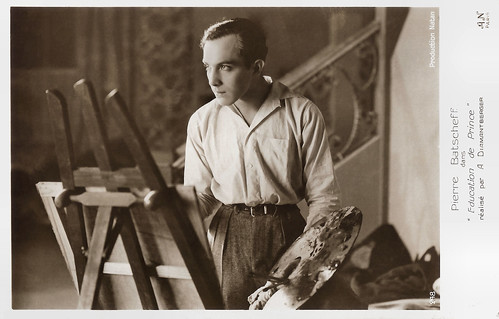
French postcard by A.N. Paris, no. 248. Photo: Production Natan. Publicity still of Pierre Batcheff in Education de prince (Henri Diamant-Berger, 1927).
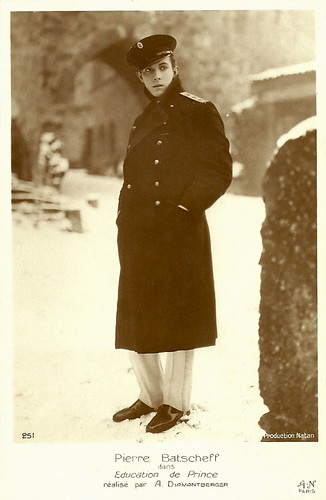
French postcard by A.N. Paris, no. 251. Photo: Production Natan. Publicity still of Pierre Batcheff in Education de prince (Henri Diamant-Berger, 1927). Collection: Didier Hanson.
Buñuel and Dali
During the shooting of La sirène des tropiques/Siren of the Tropics (Mario Nalpas, Henri Etievant, 1927) with Josephine Baker, Pierre Batcheff met the young assistant director Luis Buñuel. Buñuel offered him the leading role in his short experimental film Un chien andalou (Luis Bunuel, Salvador Dali, 1929). His remarkable part in this absurdist classic became Batcheff’s claim of fame, although the film was never a commercial success. It was even often forbidden or censored.
Batcheff made some 25 films in 8 years, including both avant-garde films like En rade/Sea Fever (Alberto Cavalcanti, 1928) and mainstream films like Monte Cristo/Monte Christo (Henri Fescourt, 1929) starring Jean Angelo.
Despite this impressive filmography, posterity linked Batcheff exclusively to Bunuel’s film. Nobody now remembers his part in Napoléon or that in the charming, clever comedy Les deux timides/Two Timid Souls (René Clair, 1928). In the latter, Batcheff played the shy Frémissin, who is hopelessly in love with the beautiful Cécile (Véra Flory). In spite of the critic's praise for its beauty, this late silent film was a failure.
The competition of the new sound cinema was too fierce. Batcheff did some early French sound films, like Les amours de minuit/The Lovers of Midnight (Augusto Genina, Marc Allégret, 1931). Probably his last part, he played in both the French and the English version of the adventure drama Baroud/Love in Morocco (1932-1933), director Rex Ingram’s final film.
Only 30, Pierre Batcheff died in Paris, on 13 April 1932, because of an overdose of Veronal. Though he didn’t leave a motif for his act, suspicions are that the arrival of sound cinema contributed to it. Caroline Hanotte at CinéArtistes gives another explanation: a few days earlier the Japanese army had invaded his birthtown in Russia. Pierre Batcheff lies buried at the cemetery of Montparnasse. He was married to film editor Danièle Piazza, who later became a director and producer. Batcheff’s co-actress in Un chien andalou, Simone Mareuil, killed herself too. In 1954 she was so depressed, that she set fire to herself in a public square.
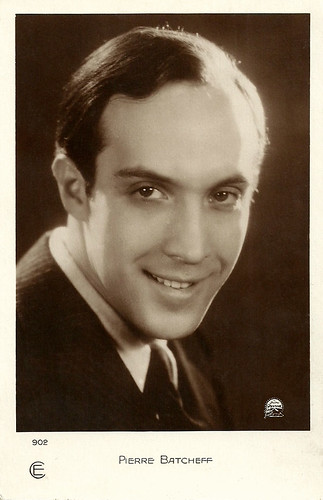
French postcard by Editions Cinémagazine, no. 902. Photo: Paramount.
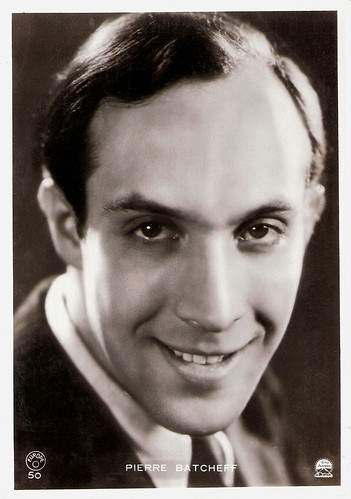
French postcard by Europe, no. 50. Photo: Paramount.
Sources: Caroline Hanotte (CinéArtistes - French), Wikipedia (English and Dutch) and IMDb.
This post was last updated on 4 May 2023.
2 comments:
Only the second Dali-involved film I have never heard him.
So tragic that both he and his co-star committed suicide.
Thank you so much for the translation of my card. :)
Post a Comment